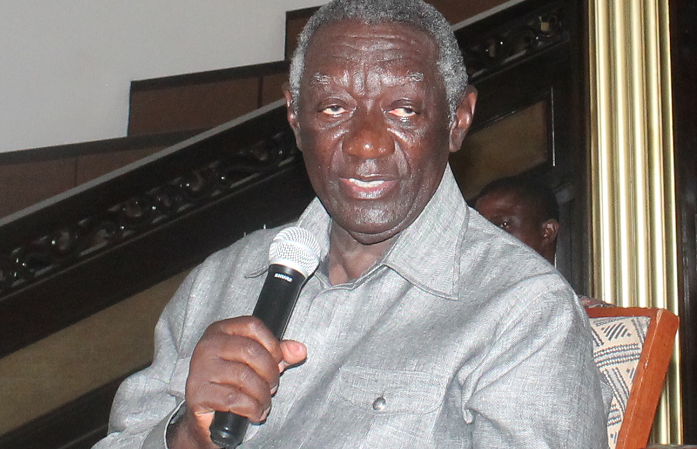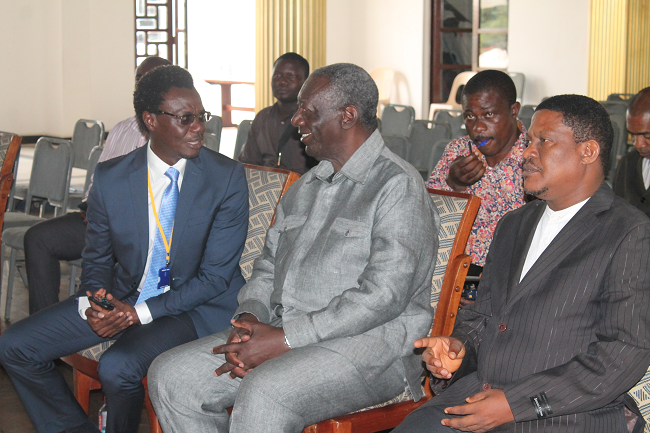
Extend tenure of Presidency to give ample time to govt to implement policies — Kufuor
Former President John Agyekum Kufuor has reiterated the need for a review of the 1992 Constitution to extend the tenure of office for elected Presidents.
He said the current four-year tenure did not provide ample time for a President to put in place the right structures to implement all of his government’s policies.
“Governance requires planning, putting in place structures and getting the right human resource to take charge of various aspects of development. If a government has any potential to do anything, it needs at least five years to be able to settle and deliver on its promises. I have been at the helm of affairs of the country and from where I sit, I will say that the current four-year tenure is not enough for any government,” he indicated.
The former President, who made the call in Accra yesterday, also called for the replacement of the Council of State with a second chamber of Parliament to take decisions on crucial national issues.
He was speaking at the 22nd annual international conference of the International Society for African Philosophy and Studies (ISAPS) at the University of Ghana, Legon in Accra.
The conference, which drew participants from academia, civil society and politics, was on the theme: “Democracy, Justice and Development in Africa: 50 Years after Independence.”
Need for second chamber
Mr Kufuor said the idea of a bicameral legislature was to ensure that due diligence and scrutiny was carried out in the vetting of appointees by the Executive and that bills were not rushed through Parliament due to partisan interests.
In that regard, he said, the second chamber ought to be composed of experts drawn from academic institutions, faith-based organisations, traditional rulers and other key institutions.
“If we have about 80 people in that chamber and the role is to put the searchlight on governance processes, I can assure you that the gains will be enormous for the country.
“From what I experienced in government, I would wish for a second chamber that will have regional and religious balance which will be structured in a way that will not frustrate the operation of the first chamber,” he added.
‘Africa democracy must reflect our culture’
The former President also held the view that it was important for African countries to adopt a module of democracy and system of government that would reflect the culture and cherished values of the continent.
He said that module of democracy ought to create an enabling environment for inclusiveness and provide space for experts and technocrats to play a pivotal role.
“The African module of multi-party democracy by African countries must take into consideration the cultural dynamism that allows us to borrow. But if we borrow, we must make sure that it fits into our system,” he said.
Mr Kufuor further opined that multi-party democracy in Africa ought to be practised in an atmosphere that created room for probity and accountability and was devoid of partisan underpinnings.

Dr Martin Adjei (left), Senior Lecturer at the Department of Philosophy and Classics at the UCC, in a dialogue with Mr John Agyekum Kufuor (middle), a former President of Ghana. Also in the photograph is Prof Joseph Agbakoba (right), President of the International Society for African Philosophy and Studies (ISAPS). Picture: MAXWELL OCLOO
Development of human capital
The President of ISAPS, Prof. Joseph Agbakoba, said African countries were bedevilled by major economic and political challenges because the Western powers had not allowed African countries to develop their own approach to development.
He, therefore, called on African leaders to focus on a development module that laid emphasis on the development of human capital.
“We are focusing so much on structures rather than agencies. Africa needs to adopt an approach that will put people in the centre if we have to make a paradigm shift,” he said.
‘Technocrats are key’
A Senior Lecturer at the Department of Classics and Philosophy at the University of Cape Coast (UCC), Prof. Raymond Osei, observed that the Western module of democracy was not suitable for Africa, since it failed to incorporate the cultural dynamics of African countries.
He said the way forward was for philosophers and other technocrats to engage in research into African institutions to provide empirical basis for African democracies to imbibe.
He said democracy in Africa ought to take into account crucial human needs such as access to education, quality health care and participatory governance and hinged on the concept of domestication.
“When members of society are assured of the above provisions, only then will they have confidence in leadership,” he said.
Background
During the latter part of President Kufuor’s tenure in office, he called for the Constitution to be reviewed to make room for the four-year tenure of office of elected Presidents to be extended.
He argued that the extension would be an opportunity for a President to form a government and have enough time to implement policies.
There were criticisms from a section of the public to the effect that the arrangement would create room for economic hardships, especially when the government in power was not living up to expectation.
